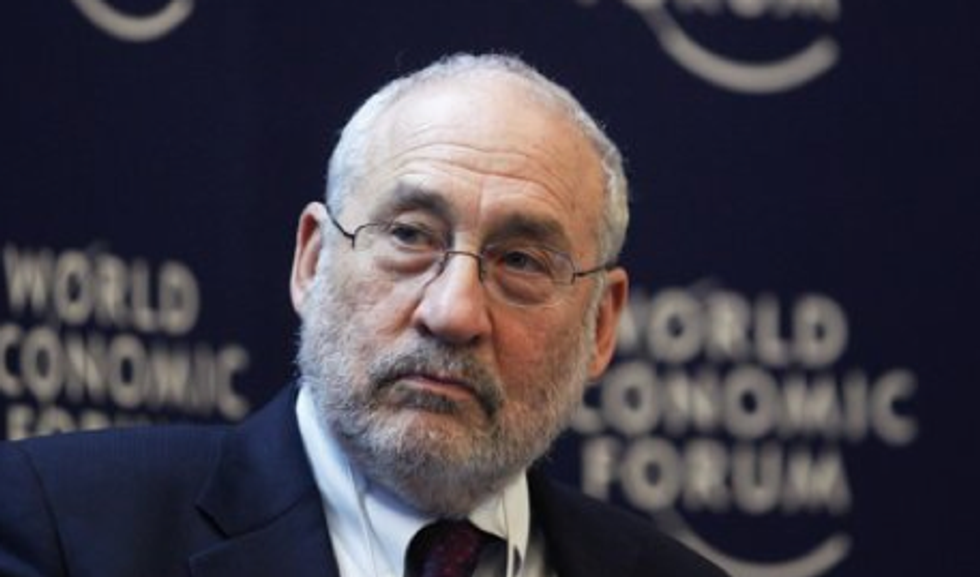

SUBSCRIBE TO OUR FREE NEWSLETTER
Daily news & progressive opinion—funded by the people, not the corporations—delivered straight to your inbox.
5
#000000
#FFFFFF
To donate by check, phone, or other method, see our More Ways to Give page.


Daily news & progressive opinion—funded by the people, not the corporations—delivered straight to your inbox.
"What do Nobel Prize-winning development economist Amartya Sen and IMF chief Christine Lagarde have in common?" asks Alan Wheatley today in the Cyprus Mail.
The anwser: They both think austerity-driven economic policies are incompatible with effectively fighting off the financial woes of Western countries still reeling from the global recession that began in 2008. Wheatley reports:
"What do Nobel Prize-winning development economist Amartya Sen and IMF chief Christine Lagarde have in common?" asks Alan Wheatley today in the Cyprus Mail.
The anwser: They both think austerity-driven economic policies are incompatible with effectively fighting off the financial woes of Western countries still reeling from the global recession that began in 2008. Wheatley reports:
Amartya Sen, an economics professor at Harvard University, said it was folly for governments to bend all their efforts to eliminate deficit spending.
Apart from stoking democratic discontent, the "austerity disease" sweeping the West was killing the goose that laid the golden egg of growth.
"It is very hard to find adequately pragmatic grounds for severe austerity that cuts demand and makes economic expansion much more problematic," Sen said in a lecture at the London Stock Exchange last week.
Sen suggested that some governments were opting for indiscriminate cuts for ideological reasons or even regarded debt reduction as a moral imperative.
And the leader of the International Monetary Fund (IMF), perhaps the global institution most widely associated with promoting the neoliberal austerity agenda over the last several decades, now seems to agree, at least in part.

"On fiscal policy, resorting to across-the-board, across-the continent, budgetary cuts will only add to recessionary pressures," IMF Managing Director Christine Lagarde said in Berlin on Monday.
"Yes, several countries have no choice but to tighten public finances, sharply and quickly. But this is not true everywhere. There is a large core where fiscal adjustment can be more gradual."
Meanwhile, citizens across Europe have not waited for confirmation from economic elites like Lagarde to speak out against austerity measures that have worsened, not aided, their lives. Instead, they have harnessed their disgust and taken to the streets.
In Romania, protests have grown steadily over the last several weeks. According to Reuters:

Protests against President Traian Basescu and his close ally, Prime Minister Emil Boc, have occurred daily for two weeks and spread around the country, initially against proposed health reforms but quickly broadening to express unhappiness with tough austerity measures and corruption.
Many demonstrators, like Amzar, have also criticised the opposition and questioned if any of Romania's current leaders can fix the country's problems. [...]
"Romanians put up with a lot if they perceive the government to be fair, but this government has come to be seen as acting unilaterally and imposing discretionary cuts," said Alina Mungiu-Pippidi of the Romanian Academic Society thinktank.
The demonstrators wave placards comparing Basescu with Ceausescu and Dracula, saying he is sucking the nation's blood. But they also criticise the opposition, some of whose MPs have said they will push for Basescu's impeachment.
Agence France-Press reports tens of thousands of Spaniards marched to protest regional austerity cuts in eastern Spain on Thursday:

The demonstrators marched in the region's three largest cities -- Alicante, Castellon and Valencia -- behind large banners that read "No to cuts to public services" in response to an appeal by Spain's main unions.
Some 200,000 people took part in the protests in the three cities, Spanish media reported, citing union officials.
The largest protest was in Valencia where about 100,000 people turned out. The protest in Alicante drew 60,000 people and the one in Castellon over 30,000.
Nurses, teachers, police and firefighters were among those who took part in the protests along with "indignant" activists, who have organised mass protests and marches since May across the country against political corruption, the economic crisis and soaring unemployment.
And in Italy, transportation workers went on strike Friday to oppose austerity-minded privatization policies pushed by Prime Minister Mario Monti. "Buses, trains and trams were disrupted in many Italian cities," Reuters reports, "While a demonstration in Rome drew thousands who protested against changes that unions fear will lead to a dilution of workers' rights."
"We're sick of these continual government programmes that always hit the weakest, the pensioners and workers and not those in the political elite or those with real economic power in Italy," said union member Mauro Rustici, a demonstrator in Rome. [...]
Objections to the mooted changes have been sharpened by growing pressure on household incomes as Italy heads into what is expected to be a severe recession in 2012.[...]
Blockades this week by truckers protesting against high fuel prices have caused serious disruptions to companies including Fiat (FIA.MI) and Coca Cola (KO.N) and led to bare shelves in many supermarkets.
Back in Davos, where the World Economic Forum is wrapping up its weeklong gathering, critics of austerity continued to press their case. As the Huffington Post reports:

"Austerity won't even prevent the next crisis, let alone solve the current one," the Nobel laureate economist Joseph Stiglitz told The Huffington Post.
Cutting government spending in times of economic weakness further reduces demand for goods and services, he said, which reduces incentives for businesses to invest and hire -- a self-reinforcing dynamic of diminishing fortunes.
In a lunch address earlier this week, the billionaire investor George Soros delivered a withering critique of austerity, one that has become something of an official minority view among those concerned about the current policy trajectory. Warning that the continued embrace of austerity could result in many years of wrenching pain, Soros singled out Germany for imposing harsh fiscal discipline on its fellow eurozone members -- not least, Greece -- as condition for financial support needed to prevent default.
"The austerity that Germany wants to impose will push Europe into a deflationary debt spiral," Soros said, referring to a cycle of falling prices, which deprive companies of an incentive to invest and hire, which in turn reduces vigor in the economy. "Reducing the budget deficit will put both wages and profits under downward pressure, the economy will contract and tax revenues will fall."
Such a scenario, Soros added, would produce a result opposite from the policy aim -- larger budget deficits, "requiring further budget cuts, and setting in motion a vicious circle."
###
Dear Common Dreams reader, The U.S. is on a fast track to authoritarianism like nothing I've ever seen. Meanwhile, corporate news outlets are utterly capitulating to Trump, twisting their coverage to avoid drawing his ire while lining up to stuff cash in his pockets. That's why I believe that Common Dreams is doing the best and most consequential reporting that we've ever done. Our small but mighty team is a progressive reporting powerhouse, covering the news every day that the corporate media never will. Our mission has always been simple: To inform. To inspire. And to ignite change for the common good. Now here's the key piece that I want all our readers to understand: None of this would be possible without your financial support. That's not just some fundraising cliche. It's the absolute and literal truth. We don't accept corporate advertising and never will. We don't have a paywall because we don't think people should be blocked from critical news based on their ability to pay. Everything we do is funded by the donations of readers like you. Will you donate now to help power the nonprofit, independent reporting of Common Dreams? Thank you for being a vital member of our community. Together, we can keep independent journalism alive when it’s needed most. - Craig Brown, Co-founder |
"What do Nobel Prize-winning development economist Amartya Sen and IMF chief Christine Lagarde have in common?" asks Alan Wheatley today in the Cyprus Mail.
The anwser: They both think austerity-driven economic policies are incompatible with effectively fighting off the financial woes of Western countries still reeling from the global recession that began in 2008. Wheatley reports:
Amartya Sen, an economics professor at Harvard University, said it was folly for governments to bend all their efforts to eliminate deficit spending.
Apart from stoking democratic discontent, the "austerity disease" sweeping the West was killing the goose that laid the golden egg of growth.
"It is very hard to find adequately pragmatic grounds for severe austerity that cuts demand and makes economic expansion much more problematic," Sen said in a lecture at the London Stock Exchange last week.
Sen suggested that some governments were opting for indiscriminate cuts for ideological reasons or even regarded debt reduction as a moral imperative.
And the leader of the International Monetary Fund (IMF), perhaps the global institution most widely associated with promoting the neoliberal austerity agenda over the last several decades, now seems to agree, at least in part.

"On fiscal policy, resorting to across-the-board, across-the continent, budgetary cuts will only add to recessionary pressures," IMF Managing Director Christine Lagarde said in Berlin on Monday.
"Yes, several countries have no choice but to tighten public finances, sharply and quickly. But this is not true everywhere. There is a large core where fiscal adjustment can be more gradual."
Meanwhile, citizens across Europe have not waited for confirmation from economic elites like Lagarde to speak out against austerity measures that have worsened, not aided, their lives. Instead, they have harnessed their disgust and taken to the streets.
In Romania, protests have grown steadily over the last several weeks. According to Reuters:

Protests against President Traian Basescu and his close ally, Prime Minister Emil Boc, have occurred daily for two weeks and spread around the country, initially against proposed health reforms but quickly broadening to express unhappiness with tough austerity measures and corruption.
Many demonstrators, like Amzar, have also criticised the opposition and questioned if any of Romania's current leaders can fix the country's problems. [...]
"Romanians put up with a lot if they perceive the government to be fair, but this government has come to be seen as acting unilaterally and imposing discretionary cuts," said Alina Mungiu-Pippidi of the Romanian Academic Society thinktank.
The demonstrators wave placards comparing Basescu with Ceausescu and Dracula, saying he is sucking the nation's blood. But they also criticise the opposition, some of whose MPs have said they will push for Basescu's impeachment.
Agence France-Press reports tens of thousands of Spaniards marched to protest regional austerity cuts in eastern Spain on Thursday:

The demonstrators marched in the region's three largest cities -- Alicante, Castellon and Valencia -- behind large banners that read "No to cuts to public services" in response to an appeal by Spain's main unions.
Some 200,000 people took part in the protests in the three cities, Spanish media reported, citing union officials.
The largest protest was in Valencia where about 100,000 people turned out. The protest in Alicante drew 60,000 people and the one in Castellon over 30,000.
Nurses, teachers, police and firefighters were among those who took part in the protests along with "indignant" activists, who have organised mass protests and marches since May across the country against political corruption, the economic crisis and soaring unemployment.
And in Italy, transportation workers went on strike Friday to oppose austerity-minded privatization policies pushed by Prime Minister Mario Monti. "Buses, trains and trams were disrupted in many Italian cities," Reuters reports, "While a demonstration in Rome drew thousands who protested against changes that unions fear will lead to a dilution of workers' rights."
"We're sick of these continual government programmes that always hit the weakest, the pensioners and workers and not those in the political elite or those with real economic power in Italy," said union member Mauro Rustici, a demonstrator in Rome. [...]
Objections to the mooted changes have been sharpened by growing pressure on household incomes as Italy heads into what is expected to be a severe recession in 2012.[...]
Blockades this week by truckers protesting against high fuel prices have caused serious disruptions to companies including Fiat (FIA.MI) and Coca Cola (KO.N) and led to bare shelves in many supermarkets.
Back in Davos, where the World Economic Forum is wrapping up its weeklong gathering, critics of austerity continued to press their case. As the Huffington Post reports:

"Austerity won't even prevent the next crisis, let alone solve the current one," the Nobel laureate economist Joseph Stiglitz told The Huffington Post.
Cutting government spending in times of economic weakness further reduces demand for goods and services, he said, which reduces incentives for businesses to invest and hire -- a self-reinforcing dynamic of diminishing fortunes.
In a lunch address earlier this week, the billionaire investor George Soros delivered a withering critique of austerity, one that has become something of an official minority view among those concerned about the current policy trajectory. Warning that the continued embrace of austerity could result in many years of wrenching pain, Soros singled out Germany for imposing harsh fiscal discipline on its fellow eurozone members -- not least, Greece -- as condition for financial support needed to prevent default.
"The austerity that Germany wants to impose will push Europe into a deflationary debt spiral," Soros said, referring to a cycle of falling prices, which deprive companies of an incentive to invest and hire, which in turn reduces vigor in the economy. "Reducing the budget deficit will put both wages and profits under downward pressure, the economy will contract and tax revenues will fall."
Such a scenario, Soros added, would produce a result opposite from the policy aim -- larger budget deficits, "requiring further budget cuts, and setting in motion a vicious circle."
###
"What do Nobel Prize-winning development economist Amartya Sen and IMF chief Christine Lagarde have in common?" asks Alan Wheatley today in the Cyprus Mail.
The anwser: They both think austerity-driven economic policies are incompatible with effectively fighting off the financial woes of Western countries still reeling from the global recession that began in 2008. Wheatley reports:
Amartya Sen, an economics professor at Harvard University, said it was folly for governments to bend all their efforts to eliminate deficit spending.
Apart from stoking democratic discontent, the "austerity disease" sweeping the West was killing the goose that laid the golden egg of growth.
"It is very hard to find adequately pragmatic grounds for severe austerity that cuts demand and makes economic expansion much more problematic," Sen said in a lecture at the London Stock Exchange last week.
Sen suggested that some governments were opting for indiscriminate cuts for ideological reasons or even regarded debt reduction as a moral imperative.
And the leader of the International Monetary Fund (IMF), perhaps the global institution most widely associated with promoting the neoliberal austerity agenda over the last several decades, now seems to agree, at least in part.

"On fiscal policy, resorting to across-the-board, across-the continent, budgetary cuts will only add to recessionary pressures," IMF Managing Director Christine Lagarde said in Berlin on Monday.
"Yes, several countries have no choice but to tighten public finances, sharply and quickly. But this is not true everywhere. There is a large core where fiscal adjustment can be more gradual."
Meanwhile, citizens across Europe have not waited for confirmation from economic elites like Lagarde to speak out against austerity measures that have worsened, not aided, their lives. Instead, they have harnessed their disgust and taken to the streets.
In Romania, protests have grown steadily over the last several weeks. According to Reuters:

Protests against President Traian Basescu and his close ally, Prime Minister Emil Boc, have occurred daily for two weeks and spread around the country, initially against proposed health reforms but quickly broadening to express unhappiness with tough austerity measures and corruption.
Many demonstrators, like Amzar, have also criticised the opposition and questioned if any of Romania's current leaders can fix the country's problems. [...]
"Romanians put up with a lot if they perceive the government to be fair, but this government has come to be seen as acting unilaterally and imposing discretionary cuts," said Alina Mungiu-Pippidi of the Romanian Academic Society thinktank.
The demonstrators wave placards comparing Basescu with Ceausescu and Dracula, saying he is sucking the nation's blood. But they also criticise the opposition, some of whose MPs have said they will push for Basescu's impeachment.
Agence France-Press reports tens of thousands of Spaniards marched to protest regional austerity cuts in eastern Spain on Thursday:

The demonstrators marched in the region's three largest cities -- Alicante, Castellon and Valencia -- behind large banners that read "No to cuts to public services" in response to an appeal by Spain's main unions.
Some 200,000 people took part in the protests in the three cities, Spanish media reported, citing union officials.
The largest protest was in Valencia where about 100,000 people turned out. The protest in Alicante drew 60,000 people and the one in Castellon over 30,000.
Nurses, teachers, police and firefighters were among those who took part in the protests along with "indignant" activists, who have organised mass protests and marches since May across the country against political corruption, the economic crisis and soaring unemployment.
And in Italy, transportation workers went on strike Friday to oppose austerity-minded privatization policies pushed by Prime Minister Mario Monti. "Buses, trains and trams were disrupted in many Italian cities," Reuters reports, "While a demonstration in Rome drew thousands who protested against changes that unions fear will lead to a dilution of workers' rights."
"We're sick of these continual government programmes that always hit the weakest, the pensioners and workers and not those in the political elite or those with real economic power in Italy," said union member Mauro Rustici, a demonstrator in Rome. [...]
Objections to the mooted changes have been sharpened by growing pressure on household incomes as Italy heads into what is expected to be a severe recession in 2012.[...]
Blockades this week by truckers protesting against high fuel prices have caused serious disruptions to companies including Fiat (FIA.MI) and Coca Cola (KO.N) and led to bare shelves in many supermarkets.
Back in Davos, where the World Economic Forum is wrapping up its weeklong gathering, critics of austerity continued to press their case. As the Huffington Post reports:

"Austerity won't even prevent the next crisis, let alone solve the current one," the Nobel laureate economist Joseph Stiglitz told The Huffington Post.
Cutting government spending in times of economic weakness further reduces demand for goods and services, he said, which reduces incentives for businesses to invest and hire -- a self-reinforcing dynamic of diminishing fortunes.
In a lunch address earlier this week, the billionaire investor George Soros delivered a withering critique of austerity, one that has become something of an official minority view among those concerned about the current policy trajectory. Warning that the continued embrace of austerity could result in many years of wrenching pain, Soros singled out Germany for imposing harsh fiscal discipline on its fellow eurozone members -- not least, Greece -- as condition for financial support needed to prevent default.
"The austerity that Germany wants to impose will push Europe into a deflationary debt spiral," Soros said, referring to a cycle of falling prices, which deprive companies of an incentive to invest and hire, which in turn reduces vigor in the economy. "Reducing the budget deficit will put both wages and profits under downward pressure, the economy will contract and tax revenues will fall."
Such a scenario, Soros added, would produce a result opposite from the policy aim -- larger budget deficits, "requiring further budget cuts, and setting in motion a vicious circle."
###